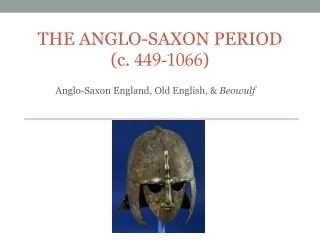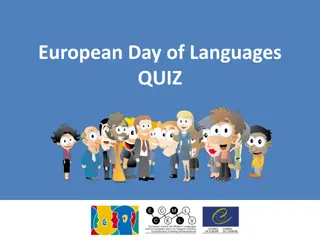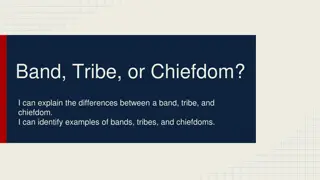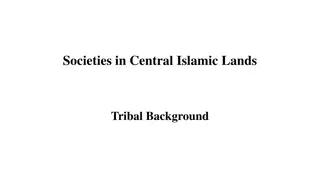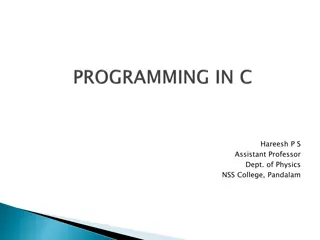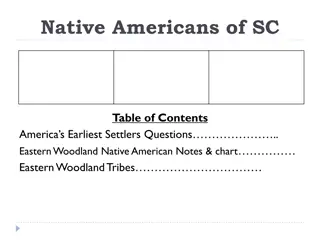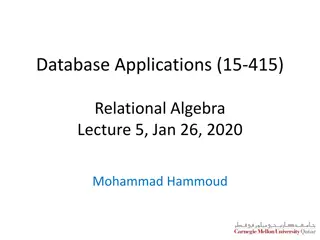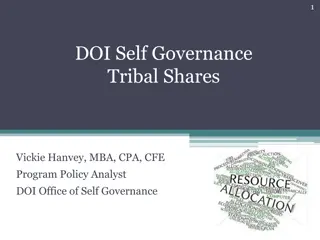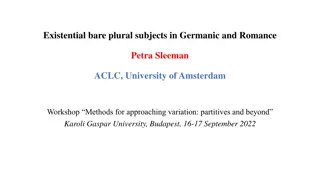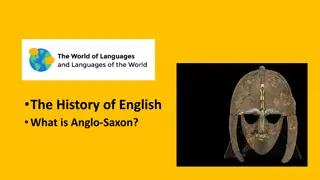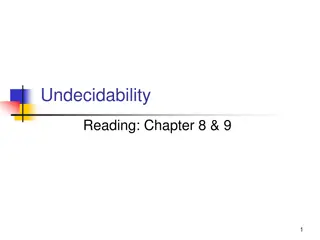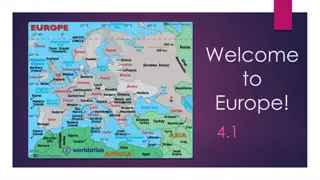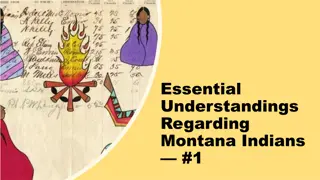Exploring Germanic Tribes and Languages in History
Delve into the ancient Germanic tribes and languages, their territories, movements during the Migration Period, surviving languages, writing systems, and encounters with prominent historical figures like Roman generals. Learn about the earliest mentions of Germans by Greek travelers and astronomers, as well as key classifications by notable historians. Uncover the rich history and characteristics of Germanic languages through the ages.
Download Presentation

Please find below an Image/Link to download the presentation.
The content on the website is provided AS IS for your information and personal use only. It may not be sold, licensed, or shared on other websites without obtaining consent from the author. Download presentation by click this link. If you encounter any issues during the download, it is possible that the publisher has removed the file from their server.
E N D
Presentation Transcript
ENGLISH AS ONE OF GERMANIC LANGUAGES Lecture 2
ACTIVE VOCABULARY German vs Germanic barbarism a testimony a merchant to raid to plunder to combat to expel a confessor an accession to the throne to challenge the right to throne a conquest Black Death to execute
Issues to cover *1. Germanic tribes and languages. General characteristics *2. Modern Germanic languages *3. The earliest period of Germanic history. Proto-Germanic period *4. Periods of history of English *5. Main historic events
1. GERMANIC TRIBES AND LANGUAGES. GENERAL CHARACTERISTICS 1. What was the territory of the Germanic tribes in 1 C AD? 2. Did they move during the Migration Period? 3. What are the branches of the Germanic languages? 4. What language had the writing system first? How? 5. Which Germanic languages survived? 6. What is barbarism ?
The earliest was the Greek traveler and astronomer from Massilia, 4th c. B.C. His testimony survived only in references to it. He was the first to mention anything about the Germans.
Roman general, statesman, and writer (100-44 B.C.). In his Commentaries on the War in Gaul (Commentarii de bello Gallico) he gives several chapters to the Germans, whom he combated and dealt with on the Rhine.
1 C AD He wrote about the Teutons in his great work Natural History. He gave a classification of Germanic tribes, which has been basically accepted by modern historians.
According to Pliny Ingveones, Istveones, Herminones West Germanic North Germanic Hilleviones East Germanic Vindili
c. 50 AD c. 120 AD He was the first person to write a book on the Germans GERMANIA , without ever leaving Rome. He talked to travelers, warriors, merchants.
2. MODERN GERMANIC LANGUAGES 1. What language family do Germanic languages belong to? 2. What IE language groups do you know? Slavic, Germanic, Baltic, Celtic, Romance, Greek, Albanian, Armenian, Iranian, Indian, Tocharian, Hittite 3. What are the non-IE languages in Europe? Finno-Ugrian language family (Finnish, Estonian, Mari, Mordovian, Hungarian), Turkic (Chuvash, Azerbaijani, Turkish), Iberian-Caucasian, Basque.
GERMANIC LANGUAGES West Germanic English; German Netherlandish Afrikaans; Frisian Yiddish Flemish North Germanic Danish; Swedish; Norwegian; Icelandic; Faroese East Germanic Gothic Vandalic Burgundian etc. (dead)
3. THE EARLIEST PERIOD OF GERMANIC HISTORY. PROTO-GERMANIC The would-be Germanic tribes belonged to the western division of the IE speech community who migrated north. 1. What is the PROTO-GERMANIC PERIOD? 2. When was it? (15 - 1 C BC) 3. What is the probable original home of the Germanic tribes? Scandinavia & the southern coast of the Baltic Seat & the region of the Elbe & the North Sea Coast 4. Did the Proto-Germanic language have dialects?
4. PERIODS OF HISTORY OF ENGLISH Old English (OE) begins with the Germanic invasion of Britain (5th c.) or with the beginning of writing (7th c.) and ends with the Norman Conquest (1066) - the period of full endings; Middle English (ME) begins with the Norman Conquest and ends with the introduction of printing (1475) - the period of leveled or reduced endings; New English (NE) starts with the introduction of printing - the period of lost endings: Early New English (1475-1700) Modern English (1700-today).
5. MAIN HISTORIC EVENTS The Roman occupation of Britain lasted nearly 400 years; it came to an end in the early 5th c. In A.D. 410, the Roman troops were officially withdrawn to Rome. The invaders came to Britain in A.D. 449 under the leadership of two Germanic kings, Hengist and Horsa; they had been invited by a British king, Vortigern, as assistants and allies in a local war. The Angles and the Saxons called themselves Angelcyn (English people) and their newly conquered territory was called Angelcynnes land ('land of the English', hence England).
*before 5 C AD In the first century B.C. Gaul was conquered by the Romans. Julius Caesar made two raids on Britain, in 55 and 54 B.C. He attacked Britain for economic reasons to obtain tin, pearls and corn, and also for strategic reasons, since rebels and refugees from Gaul found support among their British kinsmen. In 43 A.D. Britain was again invaded by Roman legions and towards the end of the century was made a province of the Roman Empire. London was among the most important trading centres of Roman Britain.
*5 C AD The 5th c. was the age of increased Germanic expansion. In the middle of the century several West Germanic tribes overran Britain and mostly colonized the island by the end of the century, though the invasions lasted well into the 6th c. The invaders came to Britain in A.D. 449 under the leadership of two Germanic kings, Hengist and Horsa; they had been invited by a British king, Vortigern, as assistants and allies in a local war. The newcomers soon dispossessed their hosts. They were called Angles and Saxons by the Romans and by the Celts but preferred to call themselves Angelcyn (English people) and applied this name to the conquered territories: Angelcynnes land ('land of the English', hence England).
* In A.D. 789, the Vikings began raiding and plundering Britain with fire and sword
* "Danes") attacked England. The struggle of the English against the Scandinavians lasted over 300 years. The Scandinavians subdued Northumbria and East Anglia, ravaged the eastern part of Mercia, and advanced on Wessex. The Scandinavians came in large numbers, founded many towns and villages, in northern England a mixed population made up of the English and the Danes sprang up. Their linguistic merging was easy, since their tongues belonged to the same linguistic group. In 11thC. England became part of a great northern empire, comprising Denmark and Norway. On Canute's death (1035) his kingdom broke up and England regained political independence; by that time it was a single state divided into six earldoms. In the 8th c. raiders from Scandinavia (the
* In A.D. 871-899, Alfred the Great, the first king of England responsible for the revival of law, religion, and learning
* Although King Alfred saved England, he could not expel the Danes who occupied an area known as Danelaw in A.D. 874-920
* In 1042-1066, the accession of Edward the Confessor to the throne of England restored King Alfred's line
*1066 *Edward the Confessor died childless in January *Harold Godwin, Earl of Wessex, elected king by the English Witanagemot (council of citizens) *William, Duke of Normandy, challenged Harold's right to the throne
In 11thc. there was the invasion of the Normans. In 1066 William the Conqueror was *1066, The Norman Conquest crown. French became the official language and remained it for 300 years. Latin (church and school), French (upper crust), English (poor) were used all together. Thus many French and Latin words were taken.
* 1200-1500: Difficult times of the Re-establishment of English 1337-1453: Hundred Years' War 1348-1350: The Black Death
* 1384, John Wycliffe made an English translation of the Bible 1536 William Tyndale was executed 1611 authorized translation of the Bible
* Standardization Geoffrey Chaucer, 1340-1400 William Caxton, 1476, introduced printing London became a very important town in its territory. Its dialect combined some features of Southern and East Midland dialects. There were some reasons for this: 1) objective economical (port), political (king s residence), cultural (educational) centre; 2) subjective popularity of Canterbury Tales written by Geoffrey Chaucer, in 1385 J. Wyclif translated the Bible into English (London dialect), in 1476 W. Caxton printed the first English book. The language was systematized what unified the country in the 15thc.
*The Renaissance, 1500-1650
*1600s-1700s science boom
*1750-1850, the Industrial Evolution
*1800-Present, Technological advancements, Era of Communication
*Great monarchs who unified the country
1. Who is a Teuton? 2. How can we learn about the Teutons (Germans)? 3. Whose testimonies have you heard of? Quiz


